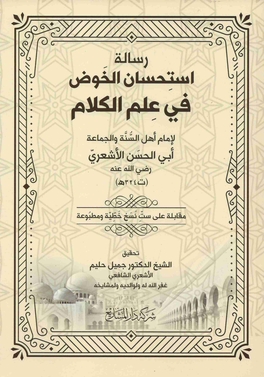 Treatise on the Appropriateness of Inquiry in the Science of Kalam | |
| Editor | Jamil Halim al-Husaini |
|---|---|
| Author | Abu al-Hasan al-Ash'ari |
| Original title | رسالة استحسان الخوض في علم الكلام |
| Translator | Richard J. McCarthy |
| Language | Arabic, English |
| Subject | Kalam (rationalistic theology) |
| Publisher |
|
| Preceded by | Maqalat al-Islamiyyin wa Ikhtilaf al-Musallin |
| Followed by | Al-Luma' fi al-Radd 'ala Ahl al-Zaygh wa al-Bida' ("The Gleams/Illuminations on the Refutation of the People of Deviation/Perversity and Heresies") |
| Published for the first time in Hyderabad, India in 1323 AH (1905/1906 AD) and again in 1344 AH (1925/1926 AD).[2] | |
Al-Hath 'ala al-Bahth (Arabic: الحث على البحث, lit. 'The Encouragement/Exhortation to Investigation/Research'),[2] better known as Risalat Istihsan al-Khawd fi 'Ilm al-Kalam (Arabic: رسالة استحسان الخوض في علم الكلام, lit. 'Treatise on the Appropriateness/Permissibility of Dealing with the Science of Kalam') is a brief treatise written by the Sunni theologian Abu al-Hasan al-Ash'ari (d. 324/935), in which he defends the use of kalam (speculative or dialectical theology) and its rational methods,[3][4] and discusses the antagonism between nazar (consideration)[Note 1] and taqlid (in this context means “blind imitation” or following the opinion and practice of others unquestionably, without due inquiry).[6]
Unlike ultra-traditionalists, al-Ash'ari considered debate, inquiry or argument, and use of the tools of logic, sense and reason in religious matters, including the matter of the doctrines of the faith as permissible, citing evidences from the Qur'an and the Sunnah that supports and endorses dialectical rational thinking, logical reasoning, and critical examination and analysis in theology.[7][8]
- ^ "اللمع في الرد على أهل الزيغ والبدع وفي آخره (رسالة في استحسان الخوض في علم الكلام للمصنف)". al-ilmiyah.com (in Arabic). Dar al-Kutub al-'Ilmiyya. Archived from the original on 18 Jan 2024.
- ^ a b "el-HAS ale'l-BAHS". islamansiklopedisi.org.tr (in Turkish). İslâm Ansiklopedisi. Archived from the original on 17 Jan 2024.
- ^ Oliver Leaman, ed. (2015). The Biographical Encyclopedia of Islamic Philosophy. Bloomsbury Publishing. p. 32. ISBN 9781472569455.
- ^ Gerhard Bowering; Patricia Crone; Mahan Mirza, eds. (2013). The Princeton Encyclopedia of Islamic Political Thought. Princeton University Press. p. 44. ISBN 9780691134840.
- ^ William C. Chittick (2010). The Sufi Path of Knowledge: Ibn al-ʿArabi's Metaphysics of Imagination. Albany, New York: State University of New York Press. p. 165. ISBN 9780791498989.
- ^ Katherine Bullock, ed. (2008). "Günther: Al-Khattabi's Critique of the State of Religious Learning". American Journal of Islamic Social Sciences. 25 (3). International Institute of Islamic Thought (IIIT): 23. doi:10.35632/ajis.v25i3.
- ^ Hamid Naseem (2001). Muslim Philosophy: Science and Mysticism. New Delhi: Sarup & Sons. p. 31. ISBN 9788176252300.
- ^ Henry Martyn Institute of Islamic Studies (1983). The Bulletin of Christian Institutes of Islamic Studies. Vol. 6. Henry Martyn Institute. p. 5.
It seems that to al-Ash'ari, the valid sourses for religious knowledge are the Qur'an, Traditions and Ijma'. Therefore, it is not surprising that al-Ash'ari in his Risala fi Istihsan al-Khawd fi 'Ilm al-Kalam described the Traditionists (Ahl al-Hadith) as being ignorant, unable to rationalise or inquire into religious matter and more inclined to blind imitation of authority (taqlid). The Traditionalists accused the Mutakallimun of being deviationists (dallin) and innovators (mubtadi'in) and raised objections against the speculative Theology (Kalam).
Cite error: There are <ref group=Note> tags on this page, but the references will not show without a {{reflist|group=Note}} template (see the help page).
